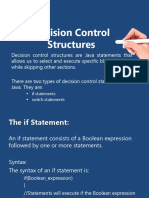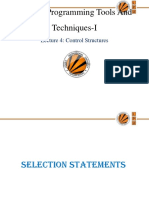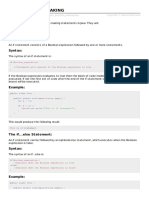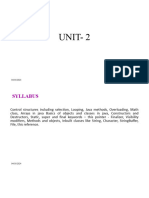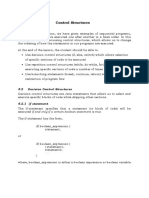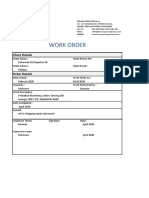0% found this document useful (0 votes)
22 views14 pagesFlow Control
The document provides an overview of flow control statements in Java, categorizing them into selection (if, if-else, else-if, switch), iteration (for, for-each, while, do-while), and transfer statements (break, continue, try, return). It includes syntax examples and explanations for each type, along with practical examples and assignments for better understanding. Additionally, it covers the use of the Scanner class for user input and various scenarios for implementing flow control in programming.
Uploaded by
kiranCopyright
© © All Rights Reserved
We take content rights seriously. If you suspect this is your content, claim it here.
Available Formats
Download as TXT, PDF, TXT or read online on Scribd
0% found this document useful (0 votes)
22 views14 pagesFlow Control
The document provides an overview of flow control statements in Java, categorizing them into selection (if, if-else, else-if, switch), iteration (for, for-each, while, do-while), and transfer statements (break, continue, try, return). It includes syntax examples and explanations for each type, along with practical examples and assignments for better understanding. Additionally, it covers the use of the Scanner class for user input and various scenarios for implementing flow control in programming.
Uploaded by
kiranCopyright
© © All Rights Reserved
We take content rights seriously. If you suspect this is your content, claim it here.
Available Formats
Download as TXT, PDF, TXT or read online on Scribd
/ 14



